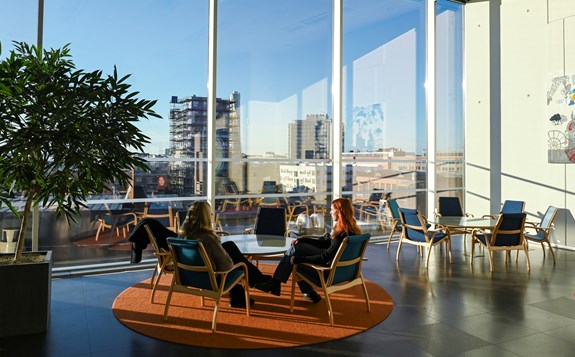International collaboration
An international and responsible university
Malmö University values diversity, academic freedom, and collaboration across borders. The international outlook strengthens the university’s role in society and enhances the learning experience for students from around the world.
University-wide networks in research and education
The European University of Cities in Post-Industrial Transition

The European University of Cities in Post-Industrial Transition
Malmö University is one of 10 universities in the UNIC university alliance. The alliance offers structures for international exchange and collaboration for students, teachers, researchers and university staff. This includes physical and virtual mobility, joint educational programmes and academic networks. UNIC is funded by the European Union's Erasmus+ programme.
International Network of Universities

International Network of Universities
International Network of Universities (INU) is a global consortium of 11 partners that is actively seeking to create innovative programmes and delivery methods to embrace internationalisation movements. The INU activities focus on advancing internationalisation of member universities, preparing students for lives and careers as global citizens and engaging students and staff in international mobility programmes.
South Africa-Sweden University Forum

South Africa-Sweden University Forum
SASUF is a transformative project uniting 37 partner universities across Sweden and South Africa. Bringing together leading researchers, teachers, students, university leaders and other stakeholders, the project will develop joint solutions to the challenges posed by the UN Sustainable Development Goals and Agenda 2030.
SAR och YERUN
Scholars at risk
Scholars at risk
Scholars at Risk (SAR) is an international network of institutions and individuals working to promote academic freedom and defend scholars' human rights worldwide. SAR offers direct assistance to academics facing threats to their lives and acts as a matchmaker between scholars and member institutions offering temporary positions to scholars.
Young European Research Universities
Young European Research Universities
YERUN brings together young research universities in Europe and offers opportunities for collaboration in research, innovation, and education. It also provides access to resources for professional development and influence on EU policies for higher education and research. YERUN works to strengthen the influence, visibility, and development of young universities at the EU level.
Southern Africa - Nordic Centre
Southern Africa - Nordic Centre
SANORD is an international network of higher education and research, committed to advancing strategic, multilateral academic collaboration between institutions in the Nordic and the Southern African regions. The network aims to provide a platform for research, education and collaboration.
IUA och EAU
International Association of Universities
International Association of Universities
The IAU is a membership organisation working for higher education globally. The organisation brings together universities from over 120 countries around shared values and offers support through advocacy, expertise and experience sharing.
European University Association
European University Association
The European University Association (EUA) represents and supports higher education institutions in about 50 countries, providing a unique forum to network and stay updated regarding the latest trends in higher education and research policies
The Baltic University Programme
The Baltic University Programme
The Baltic University Programme (BUP) is a university collaboration involving more than 110 participating universities in ten countries in the Baltic Sea region, which collaborate on education and research on sustainable development and democracy.
International collaboration in numbers
-
250
Partner universities in education
-
9
Networks
-
66
Partner countries
Global Campus
Certificat of International Merits

Certificat of International Merits
The university offers all students the opportunity to gain international experience. By participating in various internationally linked activities during their studies, students are offered the opportunity to apply for a Certificate of International Merits (CIM). The certificate is a verification of academic, personal and professional progress related to international and intercultural skills that the student has acquired both abroad and locally.
International mobility and global career opportunities

International mobility and global career opportunities
Malmö University strives to be an attractive employer in an international environment. We want to facilitate international mobility for researchers and create good career opportunities globally.
Global campus numbers
-
2000
international students on campus
-
25
English-taught master's programmes
-
7
English-taught bachelor's programmes



